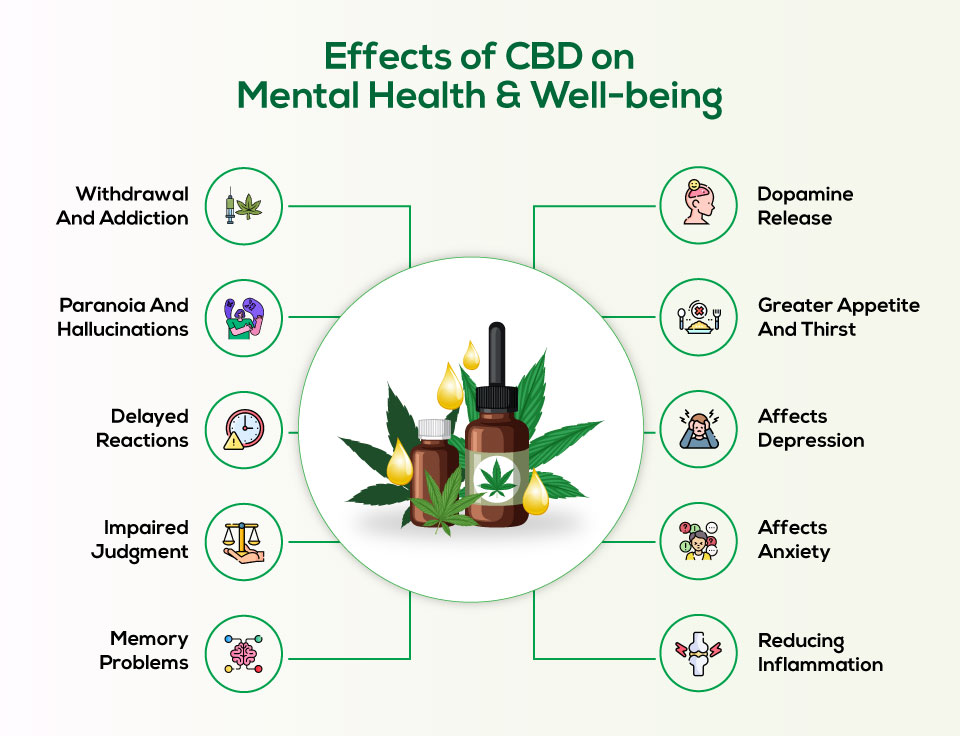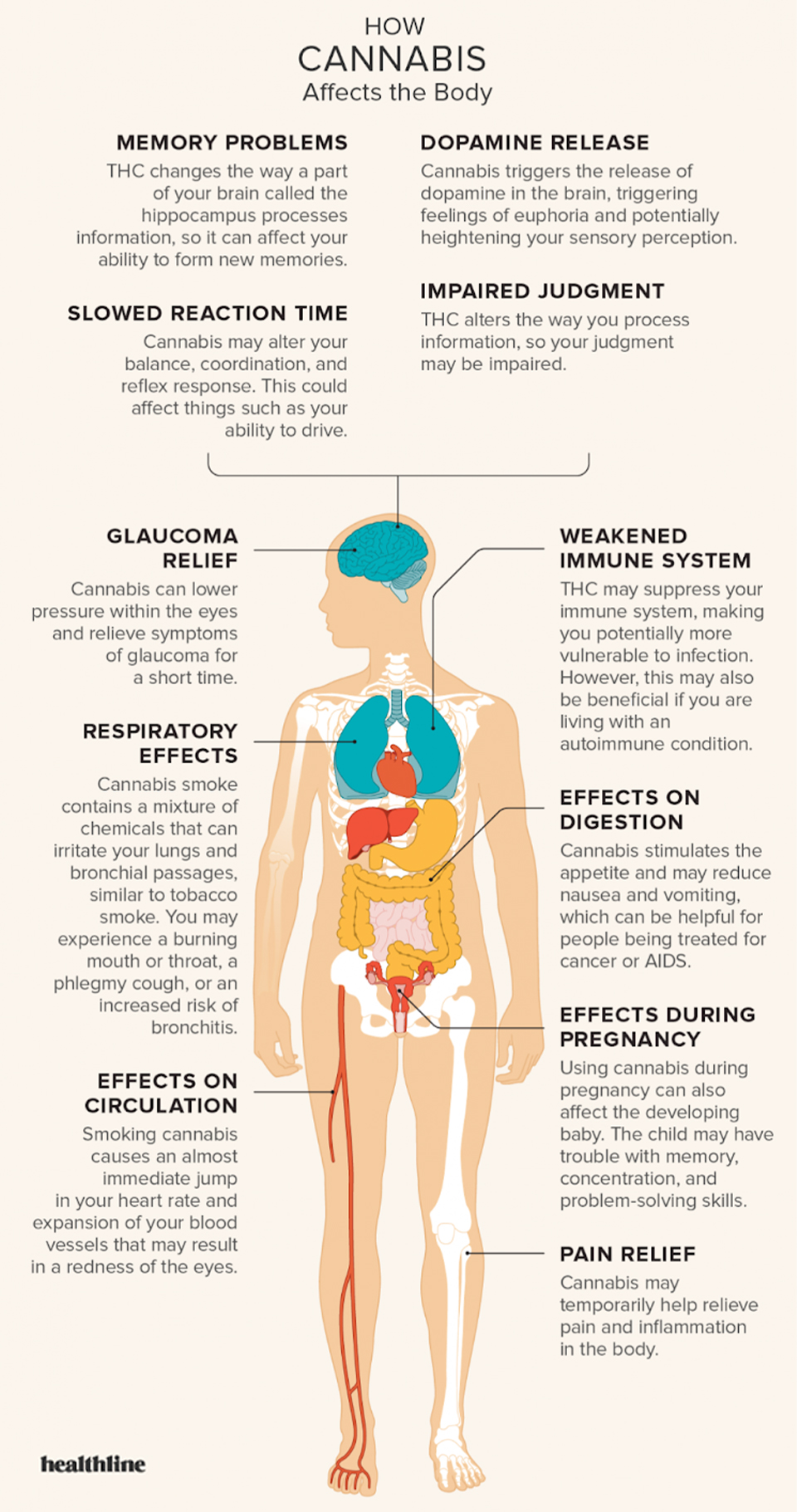
- CBD
-
by Lilly Ray
Cannabis, a plant with a history dating back thousands of years, has gained significant attention recently due to its potential health benefits. According to the National Institutes of Health, people have used marijuana, or cannabis, to treat their ailments for at least 3,000 years. However, the Food and Drug Administration has not deemed cannabis safe or effective in the treatment of any medical condition, although cannabidiol, a substance that is present in cannabis, received approval in June 2018 as a treatment for some types of epilepsy.
The primary compounds responsible for its effects are cannabinoids, which interact with the body’s endocannabinoid system. This complex network of receptors and chemicals plays a crucial role in regulating various bodily functions. In this blog, we will explore what cannabinoids do to the body, what are the effects of cannabinoids, types of cannabinoids, side effects of cannabinoids, and more.
Understanding Cannabinoids & the Endocannabinoid System:
| Cannabinoids | Endocannabinoid System |
| Cannabinoids are naturally occurring compounds found in the Cannabis sativa plant. The two most well-known cannabinoids are tetrahydrocannabinol (THC) and cannabidiol (CBD). THC is known for its psychoactive properties, while CBD is non-intoxicating and has gained popularity for its potential therapeutic uses. | The (ECS) endocannabinoid system is present in all mammals and plays a vital role in maintaining homeostasis within the body. It comprises cannabinoid receptors called CB1 and CB2, endocannabinoids, and enzymes responsible for their synthesis and breakdown. When cannabinoids from cannabis are consumed, they interact with these receptors (CB1 and CB2) and influence various physiological processes. |
Samples of Cannabinoids
There are hundreds of cannabinoids in this plant, but they have no such cognitive effects as THC. On the other hand, these parts play an important role in determining your marijuana experience.

Let’s look at some of the most and least significant cannabinoids created by cannabis Sativa plants and those from other strains.
1. CBD (cannabidiol)
2. THC (tetrahydrocannabinol)
3. CBG (cannabigerol)
4. CBN (cannabinol)
5. CBC (cannabichromene)
6. CBT (cannabicitran)
7. CBV (cannabinodivarin)
8. CBR (cannabiripsol)
9. Anandamide (endocannabinoid)
10. 2-AG (endocannabinoid)
What do Cannabinoids look like?
Illicit and synthetic cannabinoids are usually smoked, vaporized, or eaten. Pharmaceutical or medicinal cannabinoids come in various products, including raw (botanical) cannabis, which may be vaporized for medicinal purposes, as well as oils, liquids, and oral sprays. Gels have also been developed for direct application to the skin.
Cannabinoids come in many different forms, including
● Leaves, Flowers (Buds),
● Creams/Lotions
● Tinctures
● Capsules
● Oils
● Oro-Mucosal Sprays
● Edibles (CBD Gummies, Brownies, etc.)
How Cannabis Works In The Body?
Pain Relief and Anti-Inflammatory Properties:
Cannabinoids have been found to possess potent analgesic and anti-inflammatory properties, making them effective in managing various types of pain, including chronic pain, arthritis pain, reducing inflammation, and neuropathic pain. Studies have indicated that CBD interacts with the CB1 receptors in the central nervous system, modulating pain perception, suppressing inflammatory responses, and providing relief.

Researchers examined thousands of humans with fibromyalgia. Those who used CBD reported significant or moderate pain relief. These natural compounds derived from cannabis offer a promising alternative for individuals seeking pain management without the potential risks and side effects associated with traditional pain medications.
Recommended Blog: The Top 20 Best Weed Brands In California
Cardiovascular Health:
The effects of cannabinoids on cardiovascular health have been a topic of interest and ongoing research. While some studies suggest that cannabis use may temporarily increase heart rate and blood pressure, the long-term effects are not yet fully understood. Recent research looked at the effects of CBD on blood pressure in a group of male individuals with high blood pressure who took 600 mg daily for several days.
Men’s blood pressure decreased, as well as their heart rates, during stress testing in the presence of CBD. It is worth noting that individuals with pre-existing cardiovascular conditions should exercise caution and consult with their healthcare providers before using cannabis products.
It’s important to note that when purchasing CBD gummies online, you should always choose reputable retailers that provide third-party lab testing results to ensure product quality, potency, and safety. Want to take your CBD business to the next level? Contact our cannabis SEO agency today.
Management of Neurological Disorders:
Cannabis has been studied for its potential benefits in managing neurological conditions such as epilepsy, multiple sclerosis, and Parkinson’s disease. CBD has demonstrated anticonvulsant properties, while THC may help with muscle spasticity and tremors.
Research has shown that cannabinoids potentially benefit individuals with neurological disorders. CBD, in particular, has gained attention for its neuroprotective properties and ability to modulate neurotransmitters’ activity. For instance, CBD has shown promise in reducing seizures in individuals with epilepsy, with some cases experiencing significant seizure reduction. Furthermore, cannabinoids have been explored as a potential treatment for multiple sclerosis, as they may help alleviate symptoms like muscle spasticity and pain.
Mental Health and Well-being:
The impact of cannabinoids on mental health is a topic of ongoing research. Cannabinoids have been studied for their impact on mental health, including anxiety, depression, and post-traumatic stress disorder (PTSD). CBD has emerged as a promising option for anxiety management, as it interacts with serotonin receptors in the brain, influencing mood and stress responses.

Moreover, preliminary studies have suggested that CBD may have antidepressant properties, potentially alleviating symptoms of depression. However, it’s important to note that further research is needed to fully understand the effects and optimal usage of cannabinoids for mental health conditions. Moreover, if you’re running a CBD business & want to grow your business in your area/locality. In that case, we at CBD Hemp Live, are here to help you with CBD local SEO services that apply proven strategies to help you boost your brand visibility & revenue.
Chronic Pain:
Chronic pain is a debilitating condition affecting millions worldwide. Traditional pain medications, such as opioids, come with a risk of dependence and adverse side effects. This has led many individuals to explore alternative options, including cannabinoids for pain management. Cannabinoids, particularly CBD and THC, have shown promise in relieving chronic pain conditions. In 2017, the National Academies of Sciences, Engineering, and Medicine studied thousands of academic papers.
The study discovered a meaningful link between cannabinoids and pain relief. They interact with the endocannabinoid system, modulating pain signals and reducing inflammation. CBD, in particular, has been studied for its analgesic properties and ability to inhibit pain receptors, offering a non-intoxicating option for pain relief. Some individuals have reported significant reductions in pain symptoms, improved quality of life, and a decreased reliance on traditional pain medications.
It is important to note that the effectiveness of cannabinoids for chronic pain may vary from person to person, and finding the right dosage and formulation is crucial. Consulting with a healthcare professional experienced in cannabinoid therapeutics can help individuals navigate the use of cannabinoids for chronic pain management and create a personalized treatment plan.
Must Read Blog: 13 Surprising Benefits of CBD Products You Never Knew Before
Nausea and Appetite Stimulation:
THC has long been recognized for alleviating nausea and stimulating appetite. It has been utilized in cancer patients undergoing chemotherapy and individuals with eating disorders, helping to combat loss of appetite and promote weight gain.
One well-known effect of cannabis, particularly THC, is its ability to combat nausea and stimulate appetite. This property has made cannabinoids beneficial in managing conditions such as chemotherapy-induced nausea and vomiting and in individuals with eating disorders. By interacting with the CB1 receptors in the brain, cannabinoids can reduce nausea and increase appetite, providing relief to those in need.
Sleep Regulation:
Certain cannabinoids, particularly CBD, have been associated with improved sleep quality and relief from insomnia. CBD may help reduce anxiety and promote relaxation, leading to better sleep patterns. Individuals struggling with sleep-related issues may find relief through the use of cannabinoids.
CBD, in particular, has been associated with improved sleep quality and alleviating insomnia symptoms. By targeting receptors involved in the sleep-wake cycle, CBD may help regulate sleep patterns and promote a state of relaxation conducive to a good night’s sleep. Additionally, some individuals have reported experiencing a sense of calmness and reduced anxiety, which can contribute to improved sleep.
Potential Side Effects of Cannabis:

While cannabis offers potential benefits, it is essential to be aware of possible side effects, which can vary depending on the individual and the strain consumed. Long-term effects depend on several factors, including:
● How does a person use cannabis?
● How often do they use it?
● the age of the person using it
● How much does a person use at any given time?
Some common side effects may include:
● Short-term memory impairment
● Dry mouth and increased thirst
● Red eyes
● Concentration and memory issues from exposure while in the womb
● Impaired motor skills and coordination
● Lung irritation
● Increased heart rate and blood pressure
● Anxiety or paranoia (especially with high THC strains)
● Possibly lung cancer, although research does not fully support this
To Sum Up:
The effects of cannabinoids on the body are complex and diverse. Cannabis has shown promise in relieving various medical conditions and promoting general well-being. However, it is crucial to understand that individual responses may vary, and further research is needed to fully comprehend the potential benefits and risks associated with cannabis use. If you are considering using cannabis for medicinal purposes, it is advisable to consult with a healthcare professional to determine the most suitable approach for your specific needs.
Want To Grow Your Cannabis Business?
CBD Hemp Live Is Here To Help!! Are you looking to expand and grow your CBD business to new heights? Look no further. At CBD Hemp Live, we understand the challenges and complexities of running & marketing a CBD business. That’s why we offer tailored solutions designed to meet your specific needs. Whether you’re just starting or already established, we have the tools, resources, and knowledge to propel your business forward.
With our comprehensive range of hemp SEO services and expertise in the CBD industry, we are committed to taking your business to the next level. Don’t miss out on the opportunity to elevate your CBD business to new heights. Join us now. Together, we will unlock the full potential of your CBD business and seize the countless opportunities that lie ahead. Contact us today, and let’s embark on this exciting journey together!
Frequently Asked Questions
What are cannabinoids?
Cannabinoids are a naturally occurring group of chemical compounds found in the Cannabis sativa plant. including THC (tetrahydrocannabinol) and CBD (cannabidiol). They interact with the body’s endocannabinoid system and can have various effects on the body.
How do cannabinoids work in the body?
Cannabinoids interact with the endocannabinoid system, which consists of receptors (CB1 and CB2) and naturally occurring endocannabinoids in the body. This interaction can influence various physiological processes and help maintain balance, altering mood, memory, pain perception, appetite, immune responses, and homeostasis.
What is the endocannabinoid system?
The endocannabinoid system (ECS) is a complex cell-signaling system in the human body that plays important roles in central nervous system development, synaptic plasticity, and the response to endogenous and environmental insults. It regulates various physiological processes, such as mood, sleep, appetite, and immune function. Cannabinoids interact with this system, influencing its functioning.
Can cannabinoids make you high?
THC, a psychoactive cannabinoid, is responsible for the intoxicating effects commonly associated with cannabis use. Other cannabinoids like CBD do not produce a “high” effect but can influence other aspects of the body’s functioning.
Can cannabinoids be used for medical purposes?
Yes, cannabinoids have shown potential for various medical purposes, such as managing chronic pain, epilepsy, and symptoms associated with certain neurological disorders. However, consulting with healthcare professionals for personalized advice and guidance is essential.
Is it safe to use cannabinoids alongside other medications?
It’s important to consult with healthcare professionals before using cannabinoids alongside other medications. They can provide insights into potential interactions and help ensure your safety and well-being.
Can cannabinoids help with anxiety and depression?
Some research suggests cannabinoids, particularly CBD, may have potential anti-anxiety and antidepressant effects. However, more studies are needed to fully understand their efficacy, safety, and appropriate dosage for mental health conditions.
Are there any potential side effects of cannabinoid use?
While generally well-tolerated, cannabinoids can cause side effects such as dry mouth, dizziness, fatigue, impaired coordination, and cognitive effects. These effects can vary depending on the individual and the specific cannabinoid used.
